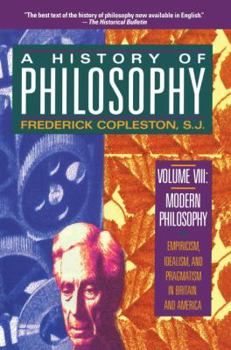A History of Philosophy, Vol. 8: Modern Philosophy - Empiricism, Idealism, and Pragmatism in Britain and America
(Book #8 in the A History of Philosophy Series)
Select Format
Select Condition 
Book Overview
Conceived originally as a serious presentation of the development of philosophy for Catholic seminary students, Frederick Copleston's nine-volume A History Of Philosophy has journeyed far beyond the... This description may be from another edition of this product.
Format:Paperback
Language:English
ISBN:0385470452
ISBN13:9780385470452
Release Date:February 1994
Publisher:Image
Length:592 Pages
Weight:1.18 lbs.
Dimensions:8.2" x 1.2" x 5.4"
Customer Reviews
3 ratings
Review Of Copleston's Eighth Volume, History Of Philosophy
Published by Thriftbooks.com User , 15 years ago
My Credentials: I'm merely a student of philosophy, not a teacher, so I can hardly speak from a scholarly position. However, I have read Copleston through the eighth volume, and so I would freely refer to myself as a vetern of his work; I know its strengths and weaknesses. Review: The volume opens with an impressive account of utilitarian philosophy, and carries on to cover a variety of empiricist and agnostic philosophers. The entries on Bradley, Bosanquet and the British idealists seem a bit excessive, whereas the writings on Emerson are minimal and Thoreau is given a one line mention. It may be that I speak from an American bias. Pragmatism is covered in fair measure, followed closely be a well-rounded exposition on the analytic movement and Russell. Admittedly, Copleston devolves toward the close of the work. His biography of Russell is scattered throughout all three sections on the philosopher, and his conclusion should be renamed "scattered notes on Wittgenstein and neo-positivism," both of which are poorly covered. Some non-thematic notes about this volume. Copleston begins adding a noticeable amount of British slang (nothing that can't be found quickly through Google, mind you).
The Best Introduction to Philosophy Out There!
Published by Thriftbooks.com User , 17 years ago
Copleston's series, "The History of Philosophy", is quite possibly the best introduction to the history of philosophical thought that has ever been published and certainly the best currently in print. You will be hard pressed to find a better collection of solid philosophical surveys in one place. The beauty of the series is that Copleston has clearly done his research on each period and each thinker of Western philosophy. I cannot recommend this series any more highly. It is a must-have collection for anyone who is a scholar (professional or casual) of philosophy, theology or any of the arts. If this isn't on your bookshelf, it should be!
From Empirical Science to Idealism and Back Again!
Published by Thriftbooks.com User , 19 years ago
Anyone that wants to study an informative yet well-written history of philososphy must thank Frederick Copleston. Of course, most histories are one-volume and while fun, hardly in-depth, this history is a whopping 9 volumes and consists of extremely detailed and thoughtful chapters on each major (and many minor) thinker(s). Remarkably enough, though, Copleston is eminently readable and is devoid of the technical jargon that would have seemed indespensible to a lesser writer. Always lucid, exciting, and exactingly informative, this set and book herein is highly recommended for the serious philophy student and the curious lay-person (who has time on their hands). This particular penultimate volume focuses on the rise of scientific empiricism in the Darwinian age, the corresponding reaction of philosophic idealism, the pragmatism of America that tried to found something of a middle ground between extremes, and the "full circle" swing back into logicl positivism and scientism. Coploeston does a good job profiling the thinkers here. In particular, I know little about idealism so it was exciting to see so many good chapters On Bosquiet, Bradley, Royce, and others. The chapters (while I still can't pretend to understand idealism) were quite lucid (at least now I'll be able to fake my way through it). Most exciting though were the chapters on J.S. Mill, the chapter on the scientific thinkers from Darwin to Huxley, the chapters on pragmatists James, Peirce, and Dewey, and the chapter on the return to empiricism with G.E. Moore. Bertrand Russell is also covered at length. Throughout it all, Copleston is mindful to keep the reader aware of the over-arching story - each thinker he broaches is brought up in a regard as a response to, or elaboration on, another thinker. The scientific empiricists came up and successfully reformulated philosophy into a materialism of sorts replete with hedonism and naturalism in ethics. The idealists came up as a reaction to that, downplaying physicalism and paying more heed to the human's spiritual craving. And justas the idealists had reacted to scientific empiricism, logical positivism reacted to idealism bringing the pendullum back to its original position after swinging too far one way and then to the other. All in all, this was a highly informative book and will be of interest to students with a hankering for the late nineteenth and early twentieth century in British and American though. The volume after this one - the last of the set - focuses on the same time period, but more intently on French (and I believe, German) thought. Enjoy.





